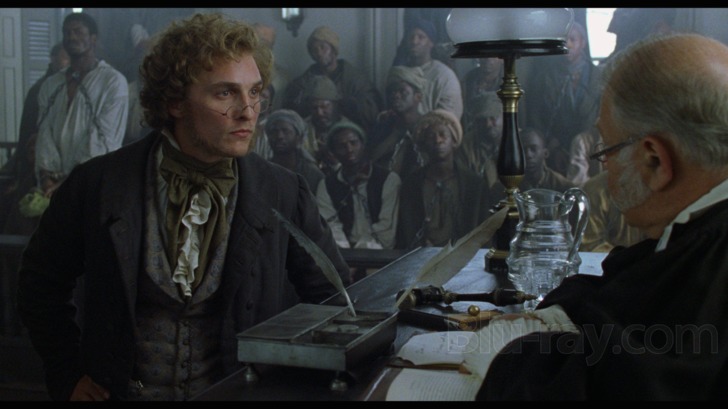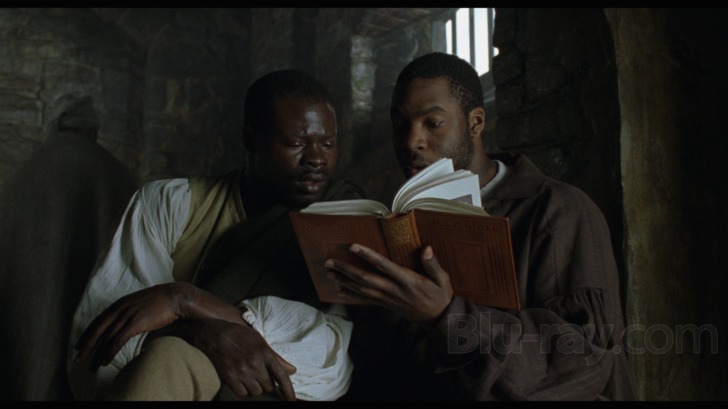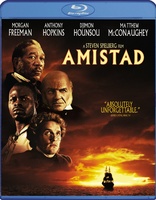Amistad Blu-ray Movie
HomeAmistad Blu-ray Movie 
Paramount Pictures | 1997 | 155 min | Rated R | May 06, 2014Movie rating
7.1 | / 10 |
Blu-ray rating
| Users | 4.2 | |
| Reviewer | 3.5 | |
| Overall | 3.5 |
Overview
Amistad (1997)
The story of the 1839 uprising aboard the Spanish slave trading vessel La Amistad and the trial that followed.
Starring: Morgan Freeman, Nigel Hawthorne, Anthony Hopkins, Djimon Hounsou, Matthew McConaugheyDirector: Steven Spielberg
| History | Uncertain |
| Drama | Uncertain |
Specifications
Video
Video codec: MPEG-4 AVC
Video resolution: 1080p
Aspect ratio: 1.85:1
Original aspect ratio: 1.85:1
Audio
English: DTS-HD Master Audio 5.1 (48kHz, 24-bit)
French: Dolby Digital 5.1 (640 kbps)
Spanish: Dolby Digital 2.0
Portuguese: Dolby Digital 2.0
Subtitles
English, English SDH, French, Portuguese, Spanish
Discs
50GB Blu-ray Disc
Single disc (1 BD)
Playback
Region free
Review
Rating summary
| Movie | 4.5 | |
| Video | 4.5 | |
| Audio | 4.0 | |
| Extras | 1.0 | |
| Overall | 3.5 |
Amistad Blu-ray Movie Review
Reviewed by Martin Liebman April 24, 2014Amistad may not be Director Steven Spielberg's magnum opus (Saving Private Ryan), and it may not even be the most dramatically important historical recreation in his canon (Schindler's List), but that should in no way diminish the impact the film has on the senses, the life it breathes into history's most notorious institution, the splendor with which the story is told, the grace with which the film is made, and the volumes it speaks on the power to overcome repression when men band together for a common cause, refusing to allow law, language, or lineage to hinder the pursuit of justice.

"Give us free!"
In 1839 the slave ship Amistad saw a revolt on her deck when slaves freed from their bondage attacked their captors and ship's crew, leaving only two alive with directions to return them to their native Africa. The surviving crew instead steered her towards the United States where she was promptly taken by a U.S. vessel and the slaves -- labeled "cargo" -- were held pending the outcome of a court case to determine their fate. Amongst those laying claim to or case for or against the Amistad's slaves were District Attorney William S. Holabird (Pete Postlethwaite) who charges the men with murder; Secretary of State John Forsyth (David Paymer) who represents Spanish Queen Isabella II's (Anna Paquin) interests to have them returned to Spain, citing international treaty; Americans Thomas Gedney (Ralph Brown) and Richard Meade (Darren E. Burrows) who claim salvage on the ship; Cubans Jose Ruiz (Geno Silva) and Pedro Montez (John Ortiz) who also claim ownership; and Abolitionists Theodore Joadson (Morgan Freeman) and Lewis Tappan (Stellan Skarsgård) who, with the help of small-time attorney Roger Sherman Baldwin (Matthew McConaughey) and former President and current Congressman John Quincy Adams (Anthony Hopkins), argue for the slaves' freedom. At the center of the controversy is Cinqué (Djimon Hounsou), a slave who represents the group and works alongside the abolitionists.
Amistad develops around a rather standard Courtroom Drama structure that's defined not simply by a drive to prove guilt or innocence but to decide the fate of individuals enslaved for profit and claimed as cargo or goods under a number of maritime acts, international treaty, and longstanding practice. The film refuses to draw its strength from sentimentality, however, and constructs its narrative, on one hand, in a straightforward pursuit of justice seen through the eyes of men brought together by a shared desire not for glory in the spotlight of a very public proceeding and to rub elbows with revered elite but instead to fight for that in which they deeply believe, even as it runs contrary to both laws and perceptions pertaining to the institution of slavery. On the other hand, the story takes on the added weight of not simply right and wrong and justice and injustice but tackles the very real ramifications of the final decision, examining everything from severed international ties to the threat of civil war. The film's rather detailed study of the complications beyond the moral questions that drive the narrative are necessary and commendable, and the attention paid to them helps to broaden the perspective and drive home the point that even where no, or little, moral ambiguity exists, there remains a much more complex haze of past, present, and future considerations at play that do not outweigh the highest moral authority but that do rightly or wrongly drag it down into a murky purgatory of sorts constructed of man's innate follies and frequent inability to escape them.
Fortunately, neither the story's intensity nor its high dramatic burden lessen the film's emotional impact. Spielberg finds the perfect balance between the harsh realities of the case and excess sentimentality, favoring the former and, while not excluding the other, allowing it to become formed from a product of the story and not vice versa. He frames the movie straight and true, allowing the narrative to dictate emotional response with only the occasional tug at the heartstrings or moment of levity in play, often in an effort not to lessen that aforementioned burden but to ease off for a time and allow the audience to settle back and remember that even in the midst of tremendous difficulty and strain, and with so much at stake, that life need not be defined by physical and emotional hardship alone. It's oftentimes the language barrier that's the catalyst for these moments of levity, and when they give way to the introduction of Chiwetel Ejiofor's interpreter character, the renewed hope that, just maybe, progress can now be made serves as its own easing of the burden and effectively removes the requirements of the subtle comic relief. In short, the film feels always in a state perfect balance, retaining a focus on its core story elements and never veering off course, maintaining a deep, meaningful purpose without evolving into dry historical accounts that alienate the audience and become more about facts and figures rather than freedom and, in many ways, family.
Amistad greatly benefits from Spielberg's keen vision and sure hand. The expert craftsmanship lends to the story both a sense of scope and importance. The picture certainly shows the occasional flair for the dramatic; it's just as much about entertainment as it is message and sheer storytelling, a fact that helps not only pace but also holding a wider audience than only students of history. Spielberg's direction is less about that sense of cinema magic he so capably demonstrates in films like Raiders of the Lost Ark and, here, more about the essence of the story. He proves himself a master of both ends of the spectrum, in Amistad showing as much skill as a narrative developer as he does a pure entertainer in other films. His stalwart craftsmanship is equalled by a superb cast that, to a player, falls into character while demonstrating the ability to, like the film, maintain an air of dramatic gravity but also find the subtle and infrequent escapes into very light humor as a counter to the grim realities the film portrays.
Amistad Blu-ray Movie, Video Quality 

Amistad's 1080p transfer may not be a traditional showstopper with bright, cheery colors and perfectly defined lifelike textures in every scene, but the Blu-ray presents the film's somewhat dark and filmic natural appearance with exacting attention to detail. Light grain remains throughout and helps define what is oftentimes stalwart texturing. The image reveals crisp, natural clothing and facial details, not to mention woods, leaves, and bricks that enjoy firm, natural textures whether in the gray-dominant courtroom interior or brighter, sun-drenched exteriors. Colors are impressive, too, even in those murkier courtroom and prison locations where the colors are naturally muted. On the high seas, however, blue waters absolutely sparkle, and red military uniforms seen late in the film dazzle. Black levels rarely drift towards dominant crush or, on the other end of the spectrum, excess brightness. Flesh tones never push too far towards an unnatural orange shading. Many scenes feature a deliberately, albeit lightly, diffused appearance. The transfer's best asset is its true cinematic texturing; the film demands to be viewed on a large screen to fully enjoy its strengths of presentation.
Amistad Blu-ray Movie, Audio Quality 

Amistad sails onto Blu-ray with a steady and satisfying DTS-HD Master Audio 5.1 lossless soundtrack. The film begins with excellent ocean and boat support elements. Crashing waves, creaking woods, and booming thunder set the stage for the chaos that ensues. Screams, gunshots, and general sounds of revolt spill into the stage with high effectiveness, effectively transforming the listening area into the wet, bloody, and violent deck. The track settles down considerably and, for much of the rest of the film, becomes a rather simple dialogue-driven listen with only the occasional light atmospherics in the form of trotting horses and rolling carriages helping to give sonic shape to the proceedings. A few action-oriented sequences appear later on; one near film's end offers a solid barrage of gunfire, cannon shot, and explosions, the latter of which plays with sturdy heft and presence.
Amistad Blu-ray Movie, Special Features and Extras 

Amistad contains two supplements, a vintage "making of" and the film's theatrical trailer.
- The Making of Amistad (SD, 26:33): A traditional featurette that blends voiceover narration with behind the scenes footage and talent and crew interviews. Specifically, it examines Djimon Hounsou's life and career; Morgan Freeman's, Matthew McConaughey's, and Anthony Hopkins' characters; the people who played the Amistad Africans; the film's cinematography, music, costuming, and production design; filming locations; Steven Spielberg's direction; and more.
- Theatrical Trailer (HD, 2:38).
Amistad Blu-ray Movie, Overall Score and Recommendation 

Some may call into question Amistad's historical accuracy, but as a film it's practically above reproach. Steven Spielberg's picture tackles a weighty subject through standard Courtroom Drama proceedings but does so with special attention to detail for flow and narrative significance while maintaining an entertainment value within a rather gloomy subject matter. While not his best film, it's a terrific entry that maintains an energy through all of the dramatic ebbs and flows. It's brilliantly crafted and very well acted, a borderline masterpiece of technical cinema and story composition. Paramount's Blu-ray release of Amistad is a little short on supplements but offers superb film-like picture and excellent cinema quality sound. Very highly recommended.
Similar titles
Similar titles you might also like

Bridge of Spies
2015

The Conspirator
2010

Roots
2016

Roots: The Complete Original Series
1977

Free State of Jones
2016

Breaker Morant
1980

Quiz Show
1994

Judgment at Nuremberg
1961

Gunpowder
2017

Roots: The Next Generations - Complete Mini-Series
1979

Thirteen Days
2000

Titanic
ITV Series
2012

Ghosts of Mississippi
1996

Lincoln
2012

Labyrinth of Lies
Im Labyrinth des Schweigens
2014

The Terror: The Complete First Season
2018

Invictus
2009

Munich
2005

Of Gods and Men
Des hommes et des dieux
2010

K-19: The Widowmaker 4K
Collector's Edition
2002
